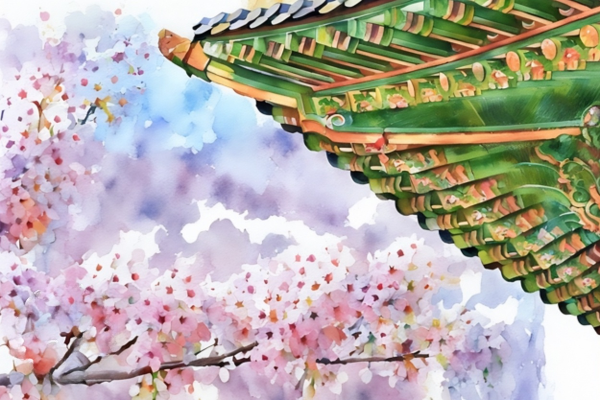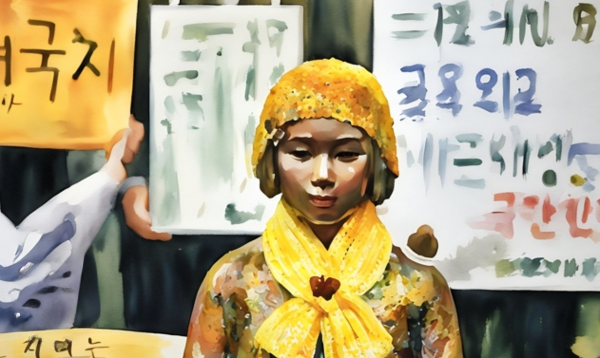My Seoul story: Fragrance of memories, cherry-blossom and the Han river

Seoul, the vibrant city bisected by the Han River, holds a special place in my heart. I spent a cherished period of my life, most exhilarating memories along its banks, soaking in the warmth of the city and the ever-changing moods of the river.
Spring paints the Han with an ethereal beauty, as cherry blossoms blanket its shores in a mesmerizing white glow. The fragrance of those blossoms lingers in my memory lane, a potent reminder of those unforgettable days.
Each season – the sweltering summers, the icy winters, and the rejuvenating springs – etched fragmented yet vivid memories, like scenes from a poignant Kim Ki-duk film, forever drifting along the river's current.
Sometimes, a longing to return to the Han's embrace washes over me. I imagine leaving everything behind and simply existing in that familiar space. Yet, I hesitate.
I ponder the future, a time when wanderlust fades, responsibilities cease, and solitude becomes my only companion. Will I then seek solace in a quiet coastal city, my life seemingly unnecessary yet peacefully adrift?
My friend, Ngan, once suggested I join her in Hoi An, in Vietnam's Danang province, when age renders me "useless."
She even envisioned us bickering our way through our twilight years, a peculiar yet comforting proposition. I never dared to ask if she was truly serious, fearing her earnest response.
After all, with her, intentions run deep.

The first meet
I will always remember my first meeting with Ngan.
The biting February air whipped around me as I stepped off the bus in Seoul a decade ago. Night had already fallen, casting long shadows across the unfamiliar campus.
Disoriented and exhausted, I stumbled towards the university dormitory, somehow managing to leave my bag behind in the rush. My stomach rumbled, reminding me of the long journey and the missed meals.
Spotting a brightly lit canteen, I headed towards it with a flicker of hope.
Inside, the aroma of unfamiliar spices filled the air, but the menu, a sea of indecipherable characters, offered no comfort.
I stood there, lost and overwhelmed, until a voice broke through my confusion.
"Hi, I'm Ngan from Vietnam," she said, offering a smile. “Who are you?” I gave my introduction.
"Oh, you must be our new classmate!" she exclaimed, her eyes widening in recognition.
"Everyone was wondering where you were! Why did you miss the orientation?"
"Well, you must be starving!" she declared, her enthusiasm infectious. "Let's see... what to eat... Do you have any change?"
I nodded, fumbling in my pockets, and she cheerfully led me towards the counter. My jaw dropped as I watched her effortlessly converse with the cashier in fluent Korean. But she said she was from Vietnam... I thought, utterly bewildered.
Over a steaming tray of food, my curiosity bubbled over. "Your Korean is incredible!" I exclaimed. "Where did you learn to speak so well?"
She laughed, a melodic sound that echoed through the canteen. "I'm studying Korean Studies back in Vietnam. What about you?"
"I don't understand a single word," I admitted sheepishly. "I didn't even know Korean Studies was a real subject! It's amazing that you're learning it all the way over in Vietnam."

The ‘comfort women’ issue
Ngan's laughter subsided, replaced by a thoughtful expression. "It's not as complicated as it sounds," she began, a hint of sadness in her voice, "At first, I just wasn't very good at other subjects, so I figured Korean Studies would be easier. But then I discovered the real reason I was drawn to it..." she trailed off, her gaze turning distant.
"During the Vietnam War," she continued, her voice now hushed, "Korean soldiers fought alongside American forces. Tragically, they were involved in several massacres and… incidents of sexual violence against Vietnamese women."
A shadow passed over her face. "There's a particular sensitivity around this issue in Korea, especially because of their own history with Japan."
She explained how, during Japan's colonization of Korea, countless Korean women were forced into sexual slavery by the Japanese military.
"They called them 'comfort women'," she said, the irony of the term heavy in the air. "A segment of Korean society, particularly women's organizations, has been fighting for recognition and justice for these women for years. They hold weekly protests in front of the Japanese embassy in Seoul."
"Similar atrocities happened in Vietnam," she said quietly. "A group of Koreans is working to document the experiences of the surviving victims, seeking acknowledgment, respect, and reparations for them."
Her eyes lit up with passion. "That's what drew me to Korean Studies. I wanted to be a part of that effort, to help give a voice to those who have been silenced for so long."
She explained how she became involved with the project, working as an interpreter and connecting with the Vietnamese women who had suffered during the war.
"Through this work," she said, "I found my purpose, and I learned to speak Korean." A small smile touched her lips. "It's been a difficult journey, but a deeply meaningful one."

A friendship forged in unusual
circumstances
Even before learning the full extent of Ngan's involvement with the Korean group, my survival instincts spotted that I needed an interpreter to navigate this new world.
Initially, the language was a complete mystery – a swirling mix of sounds that I couldn't distinguish as Chinese, Japanese, or Korean. And the Korean students, with their shy smiles and averted gazes, weren't much help.
Whenever I tried to ask a question in English on campus, they'd often blush and hurry away. Remembering Binoy Majumdar's advice to tread carefully when speaking a foreign language, I felt increasingly isolated.
Simple tasks like navigating the snow-covered streets, deciphering grocery store labels, or finding essential items became monumental challenges.
Ngan was my lifeline, but getting her attention was like trying to catch a fleeting shadow. After class, she'd always be rushing off, a whirlwind of energy, with a quick "My friends are waiting, I have a meeting, gotta go!"
"Where do you find so many Korean friends?" I'd complain. "You could at least take me with you! I'm dying of boredom in the dorm."
"What would you do there?" she'd retort. "You wouldn't understand anything, and I can't spend all my time translating for you." Then, with a playful nudge, "Unless you want to pay me for my interpretation services!"
But I was persistent, trailing after her like a lost puppy. Sometimes, out of sheer embarrassment, she'd relent and let me tag along. And gradually, through her, Seoul began to open up to me.
I explored its vibrant neighborhoods, marveled at its unique architecture, sampled the diverse cuisine in cozy restaurants, and experienced the warmth of Korean friendship and celebration.
Yet, amidst the lively gatherings and shared laughter, my attempts to get closer to Ngan seemed to fall flat.
She remained elusive, her attention always focused elsewhere. It was as if she had a secret world, a hidden part of herself that she kept carefully guarded.

An unexpected surprise
Sometimes, our group of international classmates would venture out into the city together. I couldn't help but notice the envious glances exchanged between Ngan and the other girls.
Their whispers pricked at my awareness, triggering a familiar survival instinct. As the only male in this close-knit group of female students, I knew I had to tread carefully, maintaining a delicate balance of friendship and neutrality – a kind of "equal distance diplomacy," as I called it.
Our campus had a dedicated study room for residential students, a quiet haven separate from the bustling library.
We often gathered there to work on assignments, and I relished the opportunity to contribute my ideas, especially in our Development Theories class. It was a chance to prove my worth, to compensate for my lack of Korean language skills and reliance on others.
One evening, Ngan and I were supposed to meet in the study room to collaborate on an assignment. But I fell asleep in the dormitory, and by the time I woke up, it was already late.
Rushing to the study room, I found it empty. Ngan was gone, but her books and papers lay scattered across the desk, alongside a note written in bold, elegant Bengali: "I have left!"
I stared at the note, dumbfounded. When had she learned to write Bengali? And with such beautiful penmanship! A wave of apprehension washed over me.
I remembered a day, weeks ago, when I had jokingly suggested she learn Bengali since her English was limited. "You speak such fluent Korean," I had teased, "but your English vocabulary is so poor! Why not learn Bengali? Then we could communicate without any trouble."
Had she taken my offhand comment seriously? Was this her way of maintaining "equal distance"? The thought sent a shiver down my spine.
If that was the case, I needed to stop her. My equal distance friendship policy is tanking!

The mystery and the longing
The next day, I cornered Ngan after class, my mind still reeling from her Bengali note. "When did you start learning Bengali?" I blurted out. "Where did you learn it?"
A mischievous smile played on her lips. "Didn't you say I should?" she replied, her eyes twinkling.
Panic seized me. "No, no, you don't have to learn Bengali!" I insisted, trying to backpedal. "It won't be of any use to you. Should I learn Vietnamese then? Your language is incredibly difficult, even harder than Chinese, right? With six tones and all..." I stumbled over my words, desperate to dissuade her. "I'm not up for that challenge. I'm fine as we are. You should really stop this."
She burst into laughter, the tension dissipating like morning mist. "Alright, alright," she conceded. "You should focus on learning Korean instead. It would certainly lighten my load. Plus, you'll be able to impress your new Korean girlfriend."
And that was the end of Ngan's brief foray into Bengali. Later, I realized how deeply my panicked reaction must have hurt her. In truth, her learning Bengali wouldn't have altered our friendship, but my outburst had left her feeling confused and embarrassed.
Our friendship endured, though the years have brought distance and infrequent conversations. Long stretches pass without contact, yet the memory of her offer lingers.
When I close my eyes and imagine a future where responsibilities fade and solitude beckons, I see myself in Hoi An. It’s a tranquil coastal city, transforming at night into a magical spectacle of light and festivity, with hundreds of Chinese lanterns illuminating the streets like a vibrant caravan.
"I'm building a house in my hometown Hoi An," she had told me. "My brother won't be living with me. There's no one else. I'll keep a room for you. If you want, you can come over. Just bring your books; you won't need anything else. You can wander around, and we can meet sometimes and argue."
A part of me, perhaps the cynical part, doubted her sincerity. Could this serious, enigmatic girl truly be reserving a place for me in her retired life?
But just like with her Bengali note, I lacked the courage to ask, to delve deeper into the mystery that was Ngan.
—-
Mustain Zahir is a development professional
(Translated from Bangla by Faisal Mahmud)

